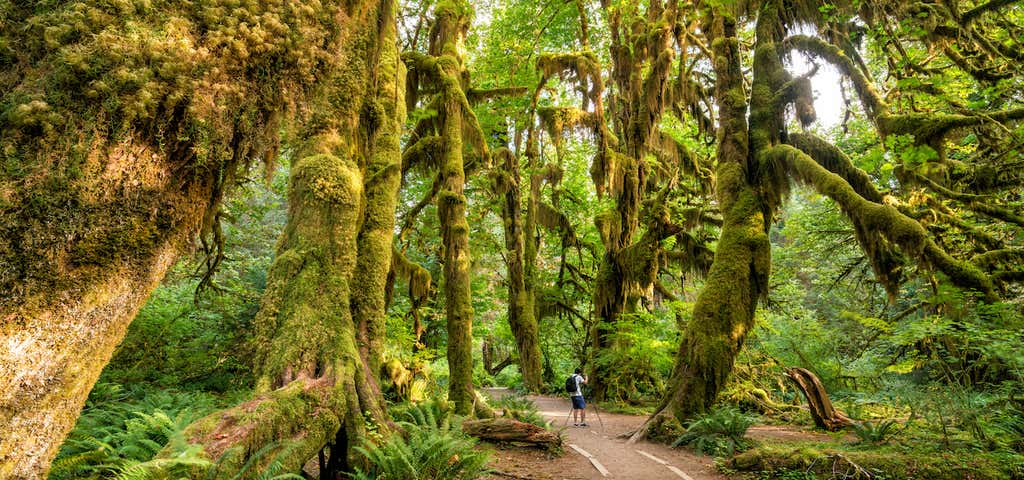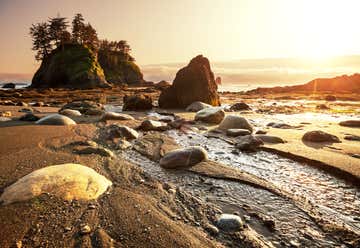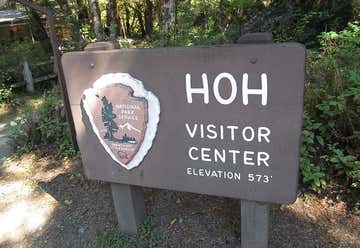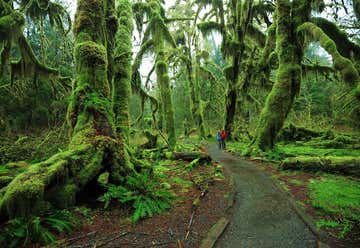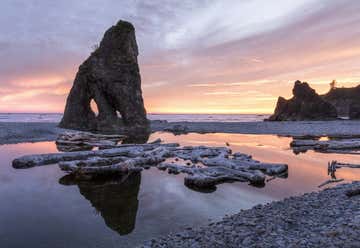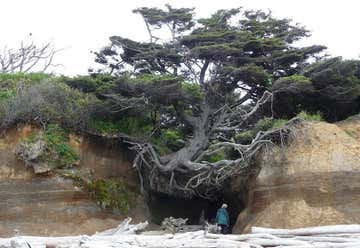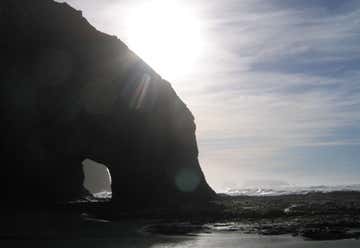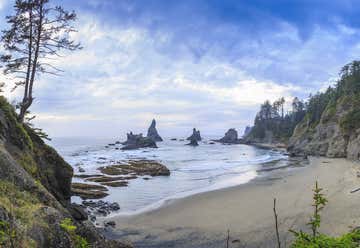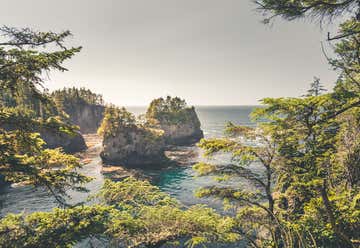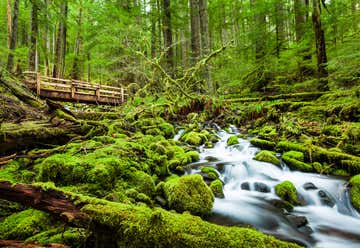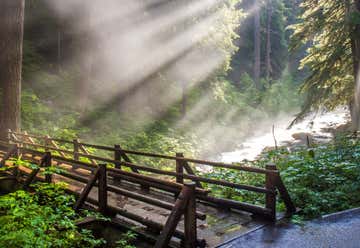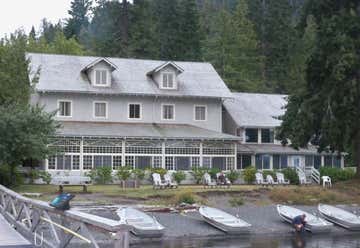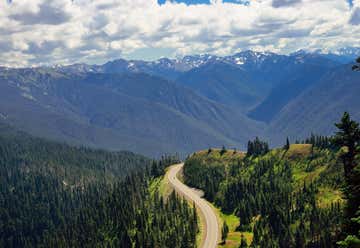When planning a trip, it can be hard to choose between a relaxing beach vacation, a serene mountain escape, or an adventure through the forest. Luckily, Olympic National Park, set in the beautiful Pacific Northwest, contains the best of everything: misty coastline, lush temperate rainforests, quiet lakes, and majestic mountains. Seriously, there's something for everyone here! Plus, it's right by Seattle, making it a great day or weekend trip, or you can make the Emerald City your home base for exploring the Olympic Peninsula.
Some tips for visiting Olympic National Park: -The Pacific Northwest is known for its mild, often-rainy, and grey weather. Olympic's Hoh Rainforest can get up to 12 feet of rain a year. The park usually sees a dry spell between July and September, so that's always a good time to visit to avoid getting too wet, but definitely come prepared for some precipitation, i.e. raincoats, boots, etc. -The park is 1,441 square miles, and while a lot of it is wilderness, there are tons of more developed areas as well. The park is divided into two sections: one that covers the Olympic Mountains, and another on the coast. -Only the Kalaloch Campground can be reserved in advance during the summer, the others are first come, first serve. However, with 12 year-round campgrounds and 4 additional seasonal campgrounds, there should be something available. -If you choose to visit in the winter, the rainforests are your best bets for hiking, as they tend to be clear of snow. There are winter activity options available in the Olympic Mountain portion of the park, too, if that's more your speed.
The Hoh Rain Forest is all that remains of a massive forest that once stretched from California to Alaska. It still receives about 140 to 170 inches of water a year, so bring along a rain jacket just in case! There's also a campground here which you should take full advantage of, because honestly, nothing sounds more relaxing than camping out in one of the country's most verdant forests. It's also home to the stunningly blue Hoh River, which is fed by glacial melt and contains pure water and ground up glacial rock, giving it a distinctive opaque blue that contrasts perfectly with the green forest. It might seem weird to imagine a rainforest so close to a glacier, but Hoh is a temperate rainforest, not a tropical one. It's also where you'll find the Hall of Mosses Trail.
Lake Quinault Lodge is a grand lodge that was built in 1926, and not a ton has changed since then, which is a good thing. Located on the lake, you have a chance to rent boats and paddleboards, or find a nearby hike to take during the day, and then at night, you can grab dinner in the historic Roosevelt Dining Room, and then relax by their massive fireplace.
The Hall of Mosses Trail is one of a few trails that traverse the park's Hoh Rainforest, and at only .8 miles, it's pretty easy. But, just because it's short doesn't mean it isn't impressive! Hikers are entirely surrounded by lush greenery, moss covers the ground, the tree trunks, and even drips from the branches. It's easy to imagine that you're in another time or place (seriously, it's so overgrown that it feels like civilization is miles, or even centuries away).
The park is home to tons of wildlife, but if you're looking for hidden gems, you won't find any more magical (or fascinating) than the marine specimens found in the tidepools of Olympic National Park's beaches, like the beautiful Ruby Beach. On any given day, you might see green anemones, pink algae, seashells, and more starfish than you can count! Since tidepools can only be seen at low tide, check the tide times before you set off, and while you're looking at the tidepools, remember to be gentle with the creatures you find. The National Park Service also suggests bringing a bag to pick up any trash you might find laying on the beach. Oh, and remember to wear sturdy shoes that you won't mind getting a little wet!
Just off Highway 101 on the southwestern coast of the Olympic Peninsula lies Kalaloch and Ruby Beach. This area is incredibly important ecologically. It’s home to thousands of marine species. The 135-mile long coastline is even protected by not one, not two, but three national wildlife refuges and the Olympic Coast National Marine Sanctuary. Located along Olympic National Park’s 73 miles of coastline, lies Kalaloch, a very popular place for tourists, hikers and campers.
Kalaloch is Quinault for “a good place to land.” The campground is open all year long and has 175 campsites. Some of which are wheelchair-accessible. These campsites fill up fast, so best to book early to reserve a spot. And there’s also Kalaloch Lodge, which is located directly on the beach.
If you happen to visit Kalaloch Campground, there’s a pretty special tree located along the beach. From the campground, there’s a trail and steps that take you 40 feet down towards the beach. Along the beach you’ll come to this tree, which is still growing despite a very large gulch that developed underneath it.
The best tidepooling can be found at Kalaloch Beach Trail 4 and Mora's Hole-in-the-Wall. Since tidepools can only be seen at low tide, check the tide times before you set off, and while you're looking at the tidepools, remember to be gentle with the creatures you find. The National Park Service also suggests bringing a bag to pick up any trash you might find laying on the beach. Oh, and remember to wear sturdy shoes that you won't mind getting a little wet!
Unlike the country's other beautiful beaches, Olympic's Shi Shi Beach has remained untouched and undeveloped, making it the perfect place to spend a night listening to the waves. To get there, you'll need to first conquer a 3-or-so-mile hike through the woods until you reach the ocean. From there, you'll need to descend about 200 feet down a cliff, either with the help of a rope along the trail, or using tree roots for support, but it's all worth the effort when you finally land on the beach. You'll definitely want to get a camping permit (you can get them from the Wilderness Information Center, or the South Shore Lake Quinault Ranger Station). Don't forget to bring along a tent, because you won't find any more magical place to spend the night in the park than on Shi Shi Beach.
Welcome to the most Northwestern point in the continental United States! It's only a one-and-a-half mile round trip to reach this view, and you'll pass through misty forests of Sitka spruce until you reach the dramatic overlook. Keep your eyes peeled for Tatoosh Island in the distance, it was once a fishing camp for Native Americans, today it has a lighthouse on it, and is home to seals, and sea lions.
There are a few waterfalls in the park, but Sol Duc Falls is one of the coolest, it's visible year-round, but is especially magnificent in the spring, as the water thunders through the verdant landscape. From the parking lot at the trailhead, it's less than two miles total out and back, so it's pretty easily accessible, too.
At Sol Duc Hot Springs Resort you'll find three mineral hot spring-fed pools of varying temperatures, plus one cool freshwater pool. Plus, the resort has everything you need for an ultra-relaxing camping trip: cozy cabins, a poolside restaurant (among other dining options), massage therapists, gorgeous views, a convenience store, an RV park, and tons more.
Furnished in turn-of-the-century period charm, Lake Crescent Lodge is a classic Pacific Northwest lodge with cabins and rooms that are perfect for a relaxing trip to the park. Plus, the onsite restaurant offers delicious, upscale dining and incredible views of the lake. TIP: the cabins are available during weekends in the winter, for a really peaceful getaway.
A drive along Hurricane Ridge Road is an absolute must-do when visiting the park, plus there's a great visitor center and a few hiking trails, with stunning views. Access in winter is limited, although the mountains are super impressive covered in a blanket of pure white snow, and depends on several factors, so check conditions and open hours before you visit during the off season.
Wind Rose Cellars uses grapes from vineyards across the state to make a wide variety of wines that should please any palate. Plus, they offer tasty bites and food, and often have live music and pieces from local artists on display, making it a fun place to unwind after a long day of hiking.
Homemade pasta, craft cocktails, local seafood, friendly service and tapas-style offerings, all served in a converted church make Blondie's Plate a favorite eatery for locals and visitors alike.
There's just something so perfect about a good burger and a beer, and that's what this Port Angeles gastropub is here for. They also have cocktails and wine, along with soups, salads, and other sandwiches, in case beer and burgers aren't your scene, and they serve brunch on Sundays.
If you're looking for something quick and filling, hit up Toga's Soup House Deli and Gourmet. The soups at this local cafe will warm you up even on the coldest of rainy days (order a soup sampler if you can't decide which you want), and their sandwiches, coffee and salads are pretty amazing, too.
The best time to visit Olympic National Park: The three month dry spell between July and September brings in about 60% of the park's visitors, so come earlier in the summer to enjoy a slightly less crowded park, and the temperatures are usually mild, in the 70's. Winter means some snow and chilly temperatures, although some parts of the park are conducive to winter sports and others receive little snow. The spring is when the waterfalls are at their most impressive, but it also means quite a bit of rain, so if you visit early in the year be prepared to get a little wet.
Steven Yackel
I am a road tripper at heart. I love to be on the road visiting all the sites. I enjoy hiking, visiting National Parks, stopping at quilt stores, Museums, Lighthouses, eating local food and washing it all down with a cold craft beer,
